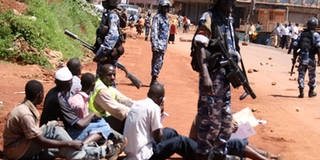Of food prices and political stability

VICTIMS: Arrested at Wandegeya for walking to work on Thursday. PHOTO BY PATIENCE AHIMBISIBWE
Kampala
The time was 3:30 p.m, on the famous date of July 14, 1789. Discontented with the aristocratic status quo and the soaring economic crisis, which saw the price of bread - the staple food of the majority French - rise by almost 67 per cent; and the general commodity prices rising at a quicker rate than the wages; the French staged protests against the unpopular common arrangement. They walked to Bastille Prison.
Upon seeing the masses on the streets and learning that the Bastille had been taken, King Louis XVI, who was residing at Versailles, asked his friend François Alexandre, the Duke of Rochefoucauld-Liancourt; “Is this a revolt?” And the Duke replied; “No, Sir, it is a revolution.” And that revolution marked the end of the King’s autocratic rule.
Ugandans walk
This week, some Ugandans took to walking to work to demonstrate against rising commodity prices and fuel costs. The walk-to-work campaign is being championed by opposition politicians. Food and fuel prices in Uganda have been rising over the last couple of months. This month, Bank of Uganda reported a near double in monthly headline inflation from 6 per cent to 11.4 per cent and the pressure on the common person has been more than just a pinch.
Dr Kizza Besigye, the leader of the main opposition party, Forum for Democratic Change, who led the walk, blames the escalating food and fuel price on the high taxes government levies on fuel. “These taxes are very high and worse still, “the money that is collected through taxes instead of going back to help the taxpayers is stolen,” he argued.
The price of fuel has risen almost two-fold from Shs2,900 to Shs4,000 for petrol, diesel from Shs1,840 to Shs3,400. The government charges Shs850 on every litter of petrol, Shs500 per litre of diesel, and Shs200 per litre of Kerosene.
Makerere University economics don Dr Eria Hisali says this has a direct trickledown effect on farm gate prices.
The opposition is making capital out of the situation knowing that many streetwise Ugandans are feeling the pinch where it pains most – the stomach.
“This was an opportunity for them to send a message. They got it and used it to the maximum,” Makerere University Institute of Social Research fellow Fredrick Kisekka told Sunday Monitor in a telephone interview. The issue of rising cost of living is being muddled up by lack of proper public information on what exactly is the cause and what government is doing to alleviate the situation.
Petroleum has suffered a knock-on effect from global economic and political tremors, but domestically, political scientist Isaac Magoola says the government should review its tax structure and stop taxing oil imports. “If you reduce tax on fuel, the effect trickles down to other products and we would not be having these problems,” he says but adds that the opposition is using the opportunity to create public discontent to the fore of government’s agenda.
Last year, countries in southern Africa were hit by escalating food prices which led to three days of what came to be known as ‘bread protests’, especially in Mozambique. The violent riots that broke up in North Africa started off in Algeria and Tunisia over escalating food prices.
Net result
The net result has been two governments overthrown – Tunisia and Egypt – while the spillover has unsettled Libya and Turkey.The walk-to-work campaign has elicited police response and it doesn’t look good for the government. “It invalidates Museveni’s victory,” says Dr Kisekka. “His winning percentage shows that he has sizeable majority support, but boxing the opposition in the corner shows that he is worried.”
“Uganda which now sits on the United Nations Human Rights Council, should be a world leader in protecting human rights but in a long time now, it hasn’t been doing enough,” Human Rights Watch senior researcher in the African division, Maria Burnett, says.
Advocates Coalition for Development and Environment Executive Director Godber Tumushabe argues that instead of suppressing its citizens, the government should address the root cause of the problem; economic mismanagement and budget indiscipline.
“As a country, we are running an economy which is not strategic,” he says. The industrial sector is growing but there is great inability for it to create enough jobs and because government is not investing in the agricultural sector, agriculture commodity prices have to increase the moment there is a food crisis.
Mob action
With such suppression, Mr Tumushabe said, the government was pushing its opposition underground. “When there is suppression of people, the anger is expressed in a different way,” he said. “There is going to be increased mob justice because it will be the only way people can express their anger.”v




